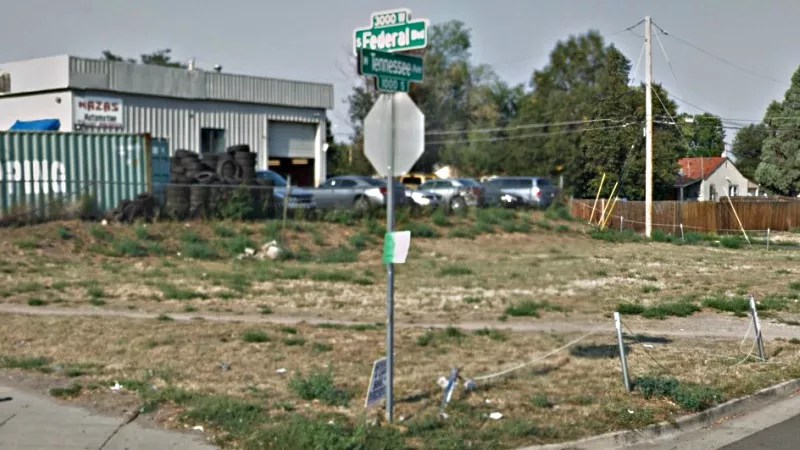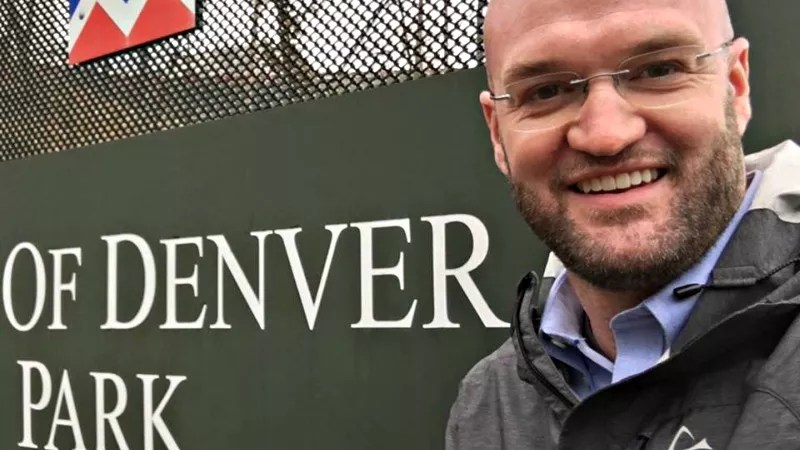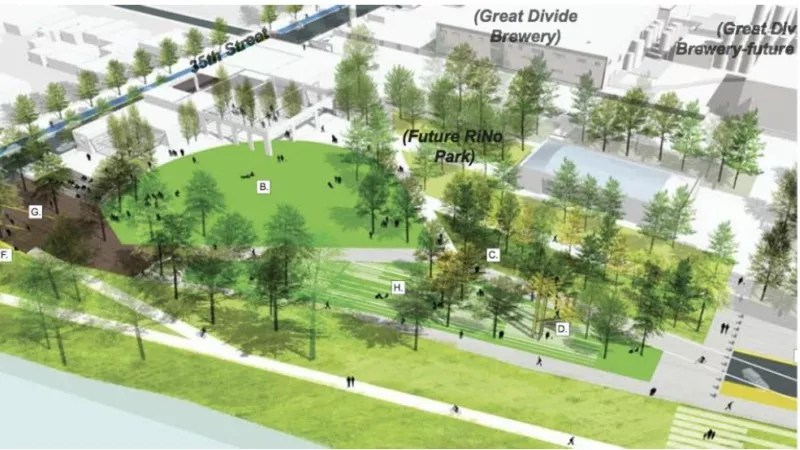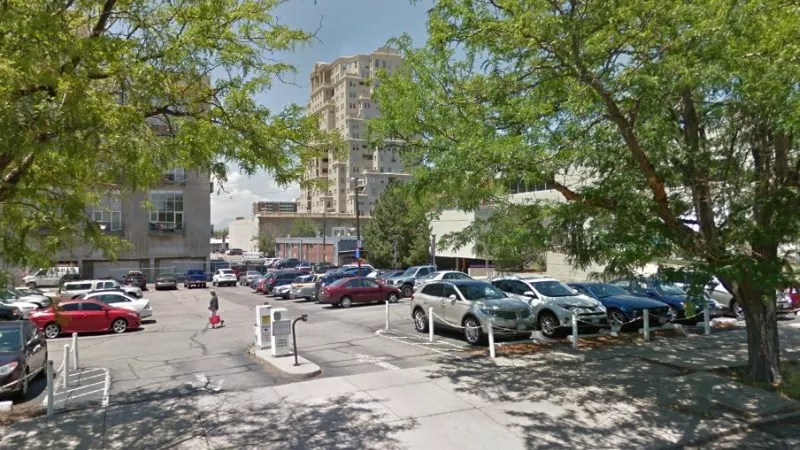
Google Maps

Audio By Carbonatix
Does the photo above show a vacant lot or a Denver park? According to Denver City Council member Jolon Clark, who’s championing a new sales tax to improve and expand parks in the Mile High City, the answer is both.
“In my district, along Tennessee starting on Federal Boulevard and heading east, there are a series of little blocks that show up on every map of Denver as parks,” Clark says. “They’re managed by the Parks Department. But if you drive by them, they’re literally weeds or grass that needs to be mowed so the city isn’t in violation of our zoning codes, because they’re too tall. There are no signs, no nothing. They appear to be vacant lots. But officially, they’re parks.”
Earlier this month, Clark made an elaborate PowerPoint presentation to Denver City Council about the tax proposal. The plan calls for a tax of .25 percent, or about two and a half cents on a $10 purchase, with the proceeds – an estimated $41.5 million per annum – dedicated to Denver’s parks. The money would be used to acquire additional parkland and open space, fund capital improvements to existing parks, pay for waterway restoration, reclamation and forestry in mountain parks and more.
If Clark’s fellow councilmembers agree that the idea is worthy, the measure will be included on the November ballot – and it may not be the only new tax for voters to consider. Earlier this month, a campaign was launched on behalf of Caring 4 Denver, a ballot proposal that calls for a separate .25 percent sales tax to boost the amount of mental health and substance-abuse services in the city.

A Facebook photo of Denver City Council member Jolon Clark.
Clark hopes these ideas aren’t pitted against each other – and neither does he want voters to feel that politicians are taking advantage of Denver’s booming economy to load them up with taxes that could hurt when times turn tougher.
“We always need to consider the overall burden and what is the threshold to that,” he acknowledges. “But I think we shouldn’t be afraid to put forward solutions to problems we see, because voters get to make that decision – and I think we have a very smart, savvy group of citizens in Denver who really weigh these things. We’re growing very quickly, and there are going to be huge missed opportunities if we don’t act. It’s our job to say, ‘Here’s a problem. It’s going to get worse. Do you want to solve it or not?'”
For Clark, the Denver parks effort is a natural outgrowth of his background.
“My degree is in natural resources,” he says, “and before I got this job, I worked for a nonprofit called the Greenway Foundation. I worked with them from when I was seventeen years old, working on parks and trails in Denver along the South Platte River. I got a firsthand look at what condition our parks are in and have worked and talked with people in this sphere – and there’s been a constant conversation about how our parks system is underfunded. We’re the only metro county that doesn’t have a dedicated sales tax for parks. Douglas County has a .17 percent tax, and the others have at least a .25 percent sales tax. Ours is zero.”
Moreover, Clark argues that even with the .25 percent increase, Denver’s sales taxes would still be below average – 7.9 percent combining city and state taxes, in comparison with 8.02 percent for what he says are “our nearest 25 city and county jurisdictions.” And because so much money is spent in Denver by people living in outlying suburbs or out-of-state tourists, the actual amount of revenue attributed to city residents would be just 24 percent of the total.

An artist’s rendering of a possible RiNo park included in City Council member Jolon Clark’s presentation about the tax proposal.
City of Denver
Beyond these numbers, however, is what Clark sees as a tremendous shortage of parks within a ten-minute walk for plenty of Denverities, including those in quickly developing areas such as RiNo and the Golden Triangle. He offers an example about the latter area.
“The former site of Rocky Mountain PBS,” located at 1025 Bannock, “is owned by the Colorado State Land Board,” he reveals. “Denver has the first right to that property and doesn’t have to get into a bidding war with private developers. That area is a park desert, where people don’t have a safe, walkable park nearby. And on top of that, we had the opportunity to bring in $2 million of lottery dollars from Great Outdoors Colorado. But you have to match those dollars, and Denver didn’t have the funding.”
As a result, he goes on, “instead of a land board-owned piece of property we could have turned into a park, it’s going to go out into the private sector and will probably be developed into a ten- or twelve-story building.”
Parks that actually exist need some care, too, Clark believes. Take Dailey Park in Baker, which is also in his district.

This parking lot at 1025 Bannock, near the old Rocky Mountain PBS headquarters, could have been a park, Clark says – but now it won’t be.
Google Maps
“It’s a dense, historic neighborhood that has a small, embedded park that’s about one block,” he explains. “It has a playground and a basketball court and a little open area. But the community went through a master-plan process and said, ‘We’d like to move the basketball court a little away from the playground, because guys playing basketball and kids on the playground aren’t always the best mix. And we’d also like a trail around the park – and the playground is out of date.'”
These suggestions “have sat on a shelf for a decade because there’s no money to deliver on the vision the community has,” Clark points out. “And it’s the same thing with Confluence Park. The Shoemaker Plaza part of it was redone, but the rest of the master plan is just sitting there because there’s no funding to do it right now. We have a lot of parks that are undeveloped, or where the configuration isn’t what the community is needing now. And there are plans to get there, but not the money.”
Should the tax pass, Clark envisions such changes will finally happen, and happen quickly – even for those vacant-lot “parks” on Tennessee.
“We could have a really cool series of pocket parks,” he enthuses. “The neighborhood’s been asking for a dog park, and we could do that. We could put a playground on one and picnic tables on another one. That way, they’d finally be real parks.”
Click to see Denver City Council member Jolon Clark’s Denver sales-tax proposal presentation.